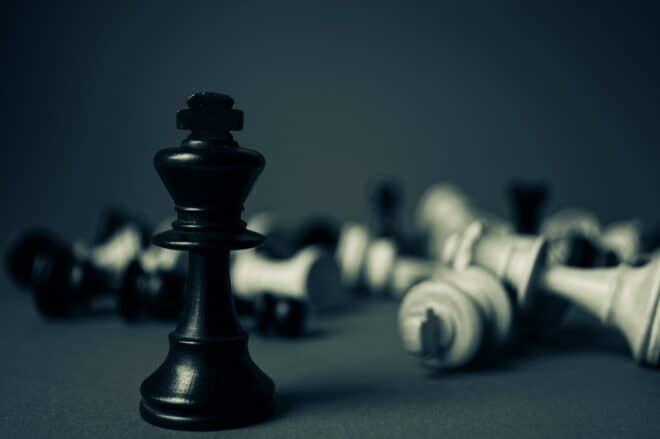Dammit, Decoder Ring

I can’t believe Decoder Ring would do this to me.
Confused? Good. Stay confused. Just like how the episode tries to warn you in advance to stop listening to the episode if you don’t know what’s going on, stop reading this article if you don’t know what’s going on. I’ll explain it, but I don’t want to. You deserve better.
Go away.
C’mon.
Okay, fine. Today’s episode of Decoder Ring regards a strange internet-born game simply called The Game, the terms of playing/losing/winning (?), and its origins. Reported on by senior producer Benjamin Frisch, “You Just Lost The Game” will make you, y’know . . . lose The Game.
So, what is The Game? You should listen to the episode to find out, but in short: everyone is always playing The Game, and someone loses The Game by thinking about The Game. You are in a state of “winning” The Game until you think about The Game, at which point you must declare you have lost The Game, thereby making others also lose The Game. So by making an episode with this title, on this subject, all of us who know about The Game and listen to Decoder Ring have been made to lose The Game.
Read more: Listen to These Podcasts After Watching “Inside” by Bo Burnham
It is 2006, and I am a high school freshman sitting in my orchestra class. By some evil, cruel twist of fate (by which I mean my school was mostly populated by a very specific nerd-ass religious sect), my public high school is not dominated by cool kids and jocks. It is dominated by choir girls, marching band kids, and theater kids. Almost all of them, somehow, are also weebs. Some of you might think that sounds like a sort of educational utopia. If this is your response instead of deep, deep terror, let me just say I would not like to hang out with you please. It was a bad place. It was a cursed place.
And it was, namely, a place of memes out loud. A place of speaking in full “I Can Haz Cheezburger” on the regular. A place of constant announcements that you have lost The Game, followed by groans and the occasional thrown pencil.
It is 2006, and I hear the sixth chair cellist in orchestra say, “I just lost The Game.” I ask what he means, and then he explains it to me, and that was the moment my soul was trapped in hell forever. In that moment, I had unwittingly made a deal with Mephastophilis and the only thing I got in return was the “magical” ability to understand some 4chan dweebs sometimes.
It is 2013, and I am in undergrad, and someone says they just lost The Game in one of my classes. I cringe.
It is 2021, and I have been free from hell for so many years. I’m a whole big kid now. I’m like, married and shit. I never have to listen to Andrew Lloyd Webber again because I never have to be in a hall filled with eighteen million theater kids again. I see an alert that one of my favorite podcasts, Decoder Ring, has updated.
It is 2021, and I have just lost The Game. I blame my hubris.
And the worst part is that the episode rules.
“I Just Lost The Game” is Decoder Ring as its finest. I’m aware of my bias here, given my specific closeness to the subject, but as the episode explains, that’s the case for most of us. The Game isn’t as obscure as it seems, though its origins are. Decoder Ring is a podcast about unraveling the mysteries of strange cultural phenomena, tracing them all the way back to their roots–and “I Just Lost The Game” does not disappoint.
The episode unfolds with Frisch’s own experiences with The Game before diving into how we got here. The story involves a science fiction society, a psychological experiment, and someone just trying to practice making websites. The Game is an example of something going viral in such an original, authentic, unmanufactured sense. “Going viral” is a term applied to just about anything when any media can get millions of views, but this was real.
But what makes this episode of Decoder Ring special isn’t just the idiosyncrasy of The Game or its origins. It’s the classic Decoder Ring whimsy and delight. The team behind Decoder Ring has mastered the art of taking something desperately uncool–e.g. Segways, soap operas, or, um, Truck Nutz–and making them fascinating. The stories are there, absolutely, but they’re bolstered by the investment the team has in that story itself.
With an episode on The Game, or any other Decoder Ring topic, it could feel like a tightrope to stay away from being condescending or straight up mean. Other, lesser podcasts, might topple over to that side without thinking twice. But Frisch and the Decoder Ring team stay earnest and curious. It’s refreshing, and it’s illuminating. It’s a step towards the growing sentiment that “cringe” just is not real.
As I listened, I found myself looking back at my high school wondering if maybe I was in the wrong about it all. Maybe there was something kind of wonderful about just how much people expressed their interests. After much deliberation, I can firmly say that no, it was definitely godawful. But there were definitely more moments of bliss laced in late nights driving with the windows down scream-singing the entire soundtrack of Repo! The Genetic Opera, or being met with understanding at a Firefly quote, or laughing to tears over “Numa Numa” than I care to remember.
Listen: “cringe” is a thing we can feel, but it’s not a thing on its own. It requires personal experience and personal embarrassment. It requires a negative nostalgia, a forced look into the past selves we tried to kill but haunt us to this day.
But podcasts like Decoder Ring help ease that gut-twisting feeling. Podcasts like Decoder Ring look at our weird, goofy pasts, and say, “Hey, what was the deal with that?” and then they actually answer that question. They take the seeming nonsense, or nothing, or ephemera, and look into both how they began and why we remember them. Decoder Ring tells us what pop phenomena tells us about ourselves.
Is “You Just Lost The Game” the perfect episode to start listening to Decoder Ring? It might be. But I implore you, instead, to look at the episode list and scroll until you cringe. That’s where you should start.













Comments
Comments are closed.